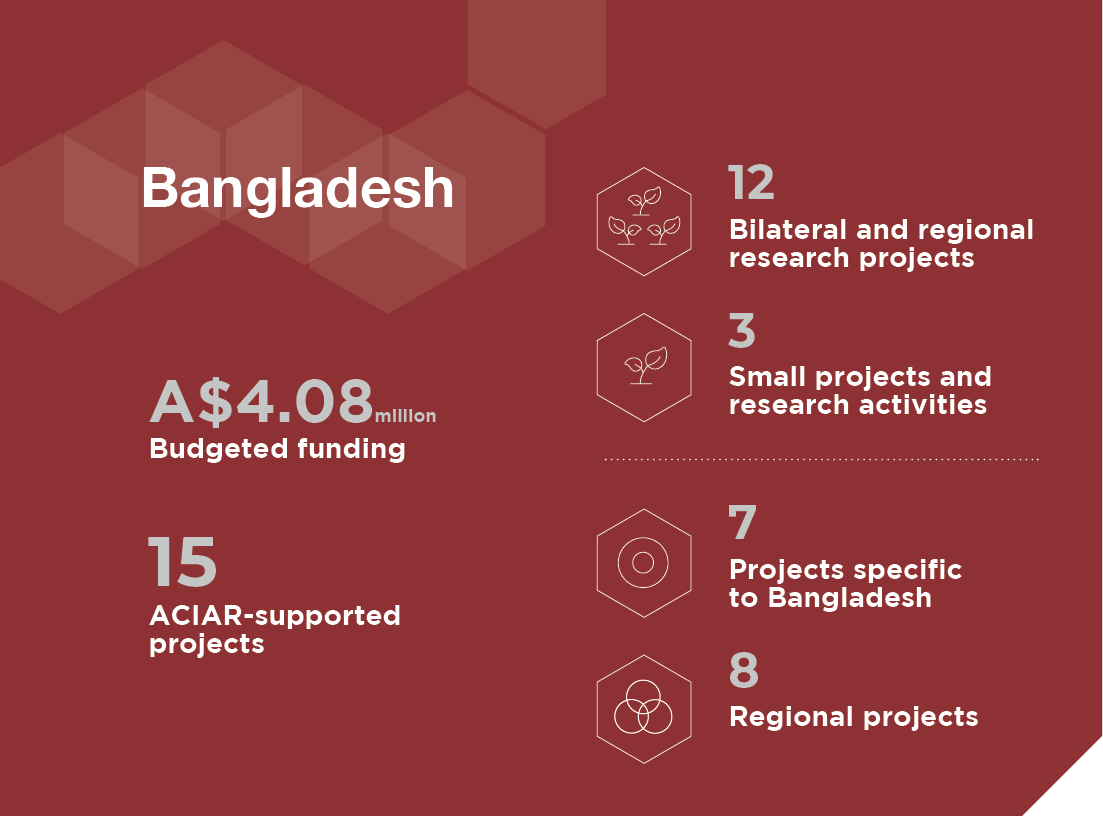Agriculture plays a pivotal role in the Bangladesh economy and in the lives of the vast majority of the population.
The agriculture sector accounts for more than half of employment in Bangladesh. Notwithstanding its transformation from a country of chronic food shortages to one of net food grain self-sufficiency, Bangladesh still faces very substantial food security challenges. While poverty is steadily declining, many people still live below the poverty line.
Recently, Bangladesh has made impressive progress in achieving national food security. Investments in agricultural research have played a pivotal role in driving productivity increases of major crops. The ongoing challenge is to improve the sustainability of agricultural production, productivity of low-lying areas and rainfed cropping systems, and increase rural incomes. This goal is adversely affected by increasing seasonal climate variability, reduced freshwater river flows and seawater intrusion.
Climate change is the most pressing issue for Bangladesh, with varying levels of vulnerability and impacts across the country. Coastal areas are prone to salinity intrusion and tropical cyclones, the floodplains in the central areas are prone to floods, the north-western region is prone to drought, the north-eastern region is prone to flash floods and the hilly regions are prone to erosion and landslides.
Bangladesh is an active participant in the global effort to combat climate change and must develop adequate adaptive capacity to protect its people and economy. In view of the substantial long-term challenges presented by climate change, the government has developed a long-term Bangladesh Delta Plan 2100 that focuses on developing approaches to sustainable management of water, environment and land resources. Being an active partner, Bangladesh plays a vital role in international and regional forums, particularly in the United Nations, Commonwealth and South Asian Association of Regional Cooperation.
The Bangladesh Climate Change Strategy and Action Plan is the de facto policy document that provides strategic direction for work on climate-change related issues. Many elements of climate-change adaptation in the country are also being addressed through specific sectoral policies. Recent consultations highlighted that the consequences of climate change on rural livelihoods is the most pressing issue facing Bangladesh. This is likely to drive thinking about future priorities for research collaboration with ACIAR.
Key priorities for Bangladesh (National Agriculture Policy 2018) that align with ACIAR objectives are:
- diversification of crops, including production of high-value crops
- development and promotion of stress-tolerant, disease-resistant and nutritious crop varieties
- improvement of crop production systems for market-oriented agriculture
- building national capacity in innovation
- extension of technologies to increase overall productivity growth and reduce the difference between research farm and field-level yields.
ACIAR supports regional approaches to assisting Bangladesh, including in the areas of natural resource management, improving trade connectivity and encouraging investments to empower women to participate in cross-regional trade opportunities.
Country priorities
Bangladesh has been an ACIAR partner country since the mid-1990s. Over time, the ACIAR program has shifted towards a farming systems approach supporting broader food security aspects, improved production and diversification of rice-based farming systems, and adaptation to climate change. This approach includes research on short-duration varieties of pulses to fit the farming system context of Bangladesh, conservation agriculture-based technologies and related mechanisation, saline land management and adaptation to climate change. ACIAR-supported programs in Bangladesh have focused on the undulating lands of the north and north-west regions and the coastal region (which is the poorest and most vulnerable region in the country). Bangladesh’s ability to maintain food security given its high vulnerability to the impacts of climate change underpins the priorities for our support.
Key agricultural production challenges are common to many countries of South Asia, and we play a role in strengthening regional research linkages between Bangladesh and other countries, particularly India (Bihar and West Bengal states) and Nepal (eastern Terai region).
Consultation with key research and development stakeholders in Bangladesh and Australia established the ACIAR–Bangladesh Collaboration Strategy 2021–2030 and confirmed the following priorities for research collaboration:
- crop improvement, with a focus on wheat, maize and pulses
- improved farming systems, with a focus on cropping systems and diversification
- water management, with a focus on managing both quantity (scarcity, groundwater and waterlogging) and quality (salinity)
- soil fertility and soil management
- markets, diversification and agricultural value chains
- agricultural mechanisation.
Research will focus on farming systems of north, north-west and coastal Bangladesh.
The Krishi Gobeshona Foundation is a strategic partner and co-investor with ACIAR in Bangladesh. The foundation is an agricultural research funding organisation that has made major investments in funding research and capacity building in ACIAR-supported projects. The partnership with the foundation for collaboration in agriculture research and development in Bangladesh was renewed in January 2021 for 5 years.
2023–24 research program
The research program addresses our high-level objectives, as outlined in the ACIAR 10-Year Strategy 2018–2027, as well as specific issues and opportunities identified by ACIAR and our partner organisations.
The following table lists ACIAR-supported projects active in Bangladesh during 2023–24.
Current and proposed projects in Bangladesh, 2023–24

